The metamorphosis of Christian L.
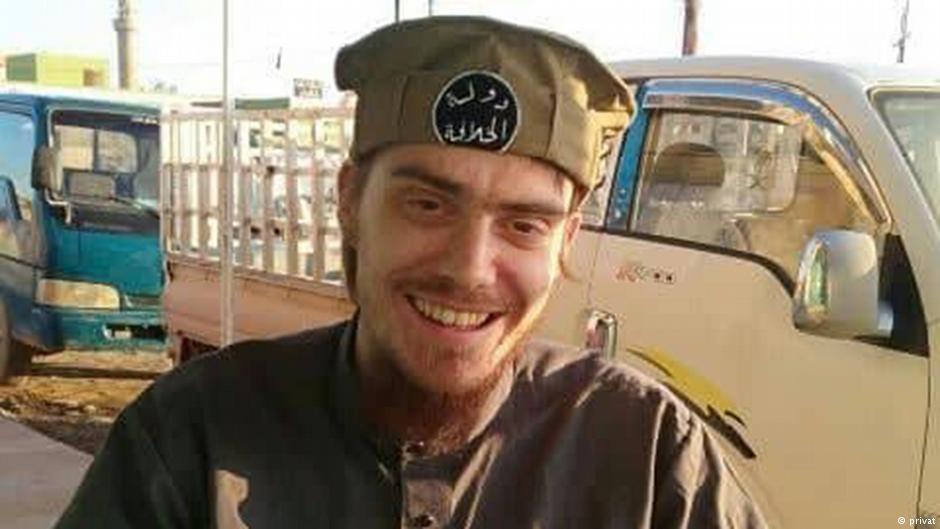
One Saturday morning in 2015, Sabine Lappe's telephone rang at a quarter to six in the morning. She was outraged, she remembers. "Who on earth is calling at this hour?" On the line was Christian, her son, 27 years old at the time. "Mama, we are in Turkey," he said, "We are waiting for the transport to Syria."
Together with his young wife, Yasmina, Christian had covertly left Germany to join the terrorist militia Islamic State (IS). Sabine Lappe begged him to turn back, but her words fell on deaf ears. "'No, we are not coming back. We go to where Allah's word cannot be changed,' he replied to me."
A painful exchange
Sabine is in her early 50s and lives alone in a small two-room apartment in the western German city of Dortmund. There are no photos of Christian in the living room, but his kaftan is still hanging near the apartment door. "It will always stay there," she says in a determined voice.
The apartment is her retreat. She is reluctant to go outside. She is the mother of a terrorist. But she is also a mother who has lost her child, even if nobody mourns Christian with her. "I loved him," she says. "But in the end, there was nothing left of the Christian he used to be."
Sabine speaks quickly. She seems jittery and admits that she is nervous about speaking to the media. In many ways, Christian's story is also the story of her own life. For hours she describes very personally how she experienced her son's radicalisation. When asked to comment on Sabine Lappe, the state security wing of the German police refused, for "reasons of data protection".
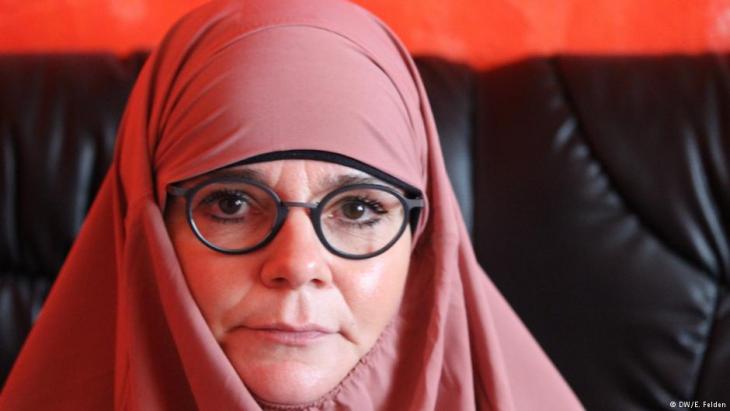
A difficult childhood
Christian was an intelligent child, eager to learn and playful, his mother says. But his upbringing was not carefree. She raised him alone. When he later started using drugs, she stood by him. As a teenager Christian fell ill. For a long time, nobody knew what was wrong with him. "He simply became less and less," Sabine says. "He ate, but he still continued to lose weight. The doctors thought it could be anorexia, perhaps for psychological reasons."
One night, at the age of 20, Christian had such severe stomach pains that Sabine called the ambulance. He was operated on that same night. The doctors diagnosed him with a form of chronic intestinal inflammation called Crohn's disease.
"Back to Allah"
Sabine remembers that Christian made a promise to himself after waking up from anaesthesia. He wanted to thank God that he had been given a second chance at life. Up to this point, Christian had had no points of contact with Islam, let alone the ultraconservative form of Salafism. His family was Catholic, although not strictly practicing.At first it looked as if things were about to turn around. Christian's health improved after several follow-up operations. He wanted to catch up on his graduation from high school and then study psychology at university. Back at school he met young men with Moroccan and Turkish roots. They sang Islam's praises, and their enthusiasm caught on Christian.
Then, in 2012, "He suddenly came home and told me that he was thinking about converting," remembers his mother. At this time, Lappe was experiencing a crisis of her own. Her partner had suddenly passed away, and she, too, was looking for new meaning in life. Because her son finally seemed to have found something that made him happy, she also began to look more closely into Islam.
Six months after Christian, Sabine also converted. Or "returned to Allah," as she herself puts it. She says the new faith has made her a "balanced person".
First differences of opinion
When she leaves her apartment, she covers herself. "But the face remains free, I don't wear a niqab. I wouldn't find that appropriate here. We're still in Germany." This was what caused her quarrels with Christian to begin, she remembers. "He quickly became much more radical in his views." The fact that his mother went to a German weekly market, chatted with a salesman and even shook his hand enraged him. "Mama, don't do that, that is haram (forbidden)," he scolded her.
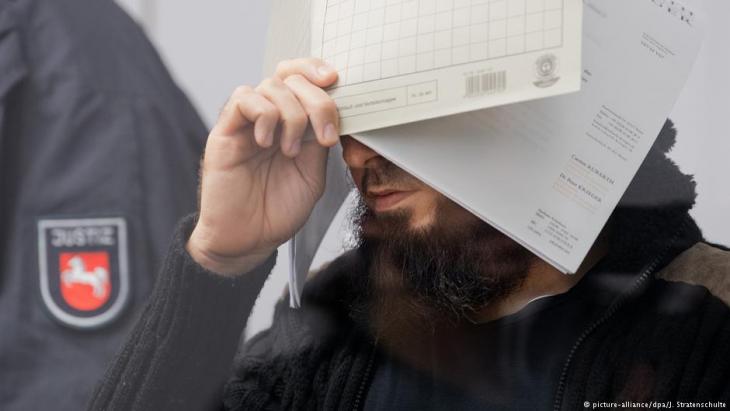
But Sabine did not put up with her son's objections: "I shake hands with everyone when I think that's the way it should be. Not with a Muslim man, of course. But I can't suddenly say to Mr. Müller who has sold me tomatoes for the past 15 years, 'I'm sorry, that's no longer possible, I'm a Muslim now.'"
Christian eventually graduated from secondary school in 2013. At that time, he already was a regular visitor of Dortmund's Taqwa Mosque. Sabine also tagged along. She wanted to see where her son spent his time and with whom. "In the beginning I was very impressed," she remembers. "You get there and as a German you suddenly feel like a star. Everyone is interested in how you found Islam, and everyone loves you."
But there were also things she didn't appreciate. "I noticed that many of the women were just repeating what their husbands had told them," she says. "I openly questioned that and told them: 'Read the Koran yourself, don't just repeat.'"
These words didn't go down well. Christian also came to feel the tension. "He was approached by brothers in faith. They told him: 'Get your mother in line. She stirs things up around here.' And he instructed me to stop." Sabine says she wasn't worried about Christian at this point. "I thought he had to prove himself as a German Muslim."In 2014 Christian met his future wife, Yasmina, a German-Moroccan woman with a troubled family past, says Sabine. "In fact, I introduced them to each other." It was at Friday prayers when the 17-year-old Yasmina approached her to inquire about Christian, because she wanted to marry a strictly religious Muslim.
It was not clear to Sabine that Yasmina intended to find a man with whom she could leave for Syria. Sabine is convinced that Yasmina was the driving force behind her son's further radicalisation. "Christian was totally besotted with this young woman who accepted him as he was," she says. "With his acne scars, his Crohn's disease and the frequent hospital stays."
After six months of knowing each other, the two married at a mosque in the city of Frankfurt. Around the New Year in 2015, Yasmina told Sabine for the first time that she and Christian intended to leave to join the self-proclaimed "Islamic State" in Syria. "Unfortunately, I didn't take that seriously, because she was still half a child."
Plans become concrete
In fact, Yasmina and Christian had apparently already begun very concrete preparations. They had planned their departure from internet cafes, including some outside of Dortmund. "Nobody would be so stupid as to do something like this from their home IP address," Sabine said.
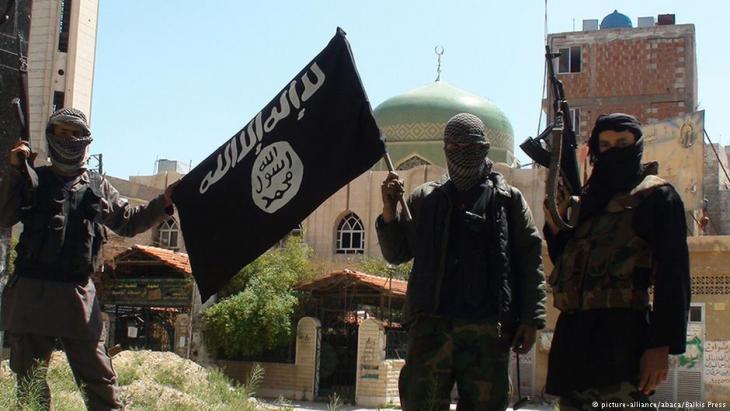
Christian had already personally known many prominent voices within Germany's Salafist scene at that time, Sabine explains. Among them was the preacher Ibrahim Abu Nagie, the founder of the now banned "LIES!" (Read!) campaign, in which German Koran translations were distributed free of charge in inner cities, and Abu Walaa, who is considered the "ambassador" of IS in Germany.
Walaa was arrested in 2016 and is currently on trial. Christian had also encountered Anis Amri, who carried out the December 2016 Christmas market attack in Berlin. In July 2015, a few weeks before Christian left for Syria, Amri had entered Germany as a refugee under a false identity.
Even prior his departure, Christian was on the radar of the state security authorities in the Dortmund police force, says Sabine, adding that she herself is still under surveillance today. She has repeatedly had to hand in her mobile phone. She says spends a lot of time online. Via Facebook, she keeps in touch with people who belong to the Salafist scene. She says she does this in order to learn as much as possible about Christian – even after his death.
Journey to Islamic State
After Christian and Yasmina's departure in September 2015, Sabine regularly received phone calls and WhatsApp messages, she remembers. But there were also weeks without any contact at all. It was always Christian, who called her from different numbers. She couldn't reach him on her own: "He was in Raqqa, in Idlib and in Abu Kamal. And once also in Iraq."She says she tried again and again to persuade him to turn back. "But as crazy as it may sound, he was there with his heart and soul." And then the video surfaced. "That was the moment when he really became a stranger to me," Sabine says. In September 2016, exactly one year after Christian and Yasmina had left Germany, a video was published on the IS-linked online platform Furat Media. In it, Christian, who had since named himself Abu Issa al-Almani, tells his story.
He talks about his disease, the meaning of life and the answers he found in Islam. He also openly calls for attacks in Europe.
In addition to the sequences in which he looks straight into the camera, there are disturbing images in which the chained hand of a man can be seen — and a descending axe. Whether it was Christian who chops off the man's hand is unclear. But it is he who gives the tortured man a kiss on the head in the next shot.
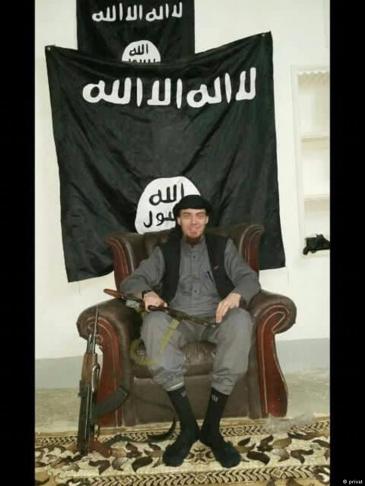
Pregnancy test presented on a Kalashnikov
For Sabine, the world collapsed when she saw the film: "I can't understand how you can do something like this. That's simply wrong. It's not in the Koran, not in any surah (chapter)." When she confronted him in their next telephone conversation, he called her an infidel. "He accused me of not having understood my faith correctly."
She finally lost her last bit of hope that Christian would one day return repentant. "He would have maybe gotten 10 to 15 years in prison, of course." Absolutely appropriate, she believes, "But in the cell I could have at least visited him." During the interview, Sabine always talks about her son Christian. She does not use the name Abu Issa al-Almani. "For me he is, and remains, Christian."
She avoids the question of whether Christian killed people. "Let me put it this way: he didn't just peel the potatoes for [IS leader Abu Bakr] al-Baghdadi. He was totally behind what he was doing. And that makes it so infinitely difficult for me. Christian wanted to go down in history and die for the right thing as a German Muslim."
Then something unexpected happened. One day, she received a photo via WhatsApp: a radiant Christian, next to her daughter-in-law Yasmina, fully veiled. Then a second picture came through: a Kalashnikov rifle with a positive pregnancy test placed on its magazine.
Sabine Lappe says she felt nauseous at the sight. "The two of them were clearly happy and proud. But the prospect of becoming a father made Christian even more radical."
Death in the desert sand
On 1 August 2017, Sabine spoke to her son for the last time. "He said that he was returning to the battlefield and that he loved me." She remembers that she had a very bad feeling, a dark premonition. Christian felt it too, she is convinced. He had provided for Yasmina. In case something happened to him, Yasmina should marry an Iraqi fighter of his choice; everything had already been discussed.On 19 September, the next call came through, this time from her daughter-in-law: "She proudly said that Issa was now Shahid, a martyr. He had died in the fight for Allah." Sabine's voice now sounds bitter: "No, Christian did not die in the fight for Allah, but in the fight for al-Baghdadi and his criminals." Photos and videos of Christian's bloody body in the desert sand east of Homs quickly appeared on social media channels.
Sabine now has tears in her eyes, for the first and only time during the hours of conversation. "In such a moment you don't think anymore," she says. She speaks about the grief, the horror, the powerlessness. Faith gives her stability. "I find peace in it."
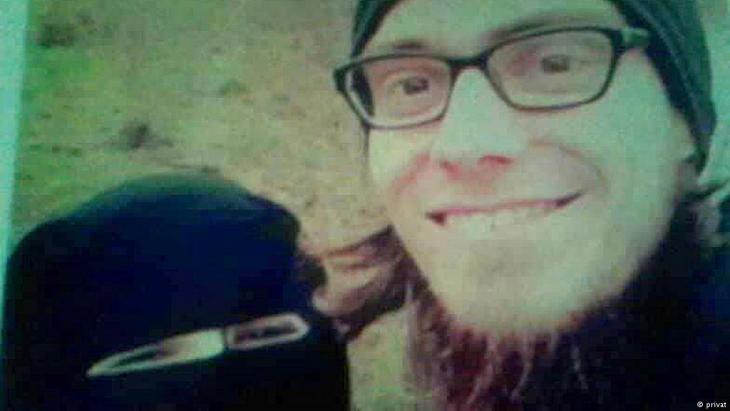
The unreachable grandson
She is a lonely woman with almost no one left. People try to avoid her as soon as they learn who she is. "Are you the mother of THE Christian Lappe?" She has grown used to the question. "Yes, I AM the mother of THE Christian Lappe," is her usual reply. "And I am not dangerous. I don't wear a Kalashnikov under my robes, and I don't chop anyone's hands off, either."
The mother of a dead terrorist. That is who she has become. The label clings to her. The pharmacy on her street doesn't serve her. "When I wanted to redeem a medical prescription the other day, I was asked to leave. You are simply an idiot. You are the mother who failed. Or you are considered a terrorist yourself." She hasn't visited her old mosque community in a long time, either. The congregation fears that she would cast a bad light on them.
At the end of 2017 Christian's son was born in what is now largely former IS territory in Syria – on his fatherʹs birthday. Sabine shows some photos. The boy resembles Christian. His widow, Yasmina, is now married to the Iraqi fighter Christian chose for her. Sometimes weeks pass before Sabine hears from her.
Sabine's greatest wish is to be able to hold her grandson. But she doesn't believe that her dream will ever come true. "I felt it with Christian that I would lose him. And I feel that I will lose the little one, too."
Esther Felden
© Deutsche Welle 2018
